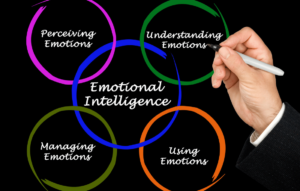Have you ever found yourself in a situation where you reacted in a way that you regretted later? Maybe it was an argument with a partner, a stressful day at work, or even a flash of road rage. These instances are all too common in the modern world, and for a lot of guys, they highlight a crucial, yet often overlooked, aspect of our well-being: emotional intelligence.
So, what the heck is emotional intelligence anyways? And why should you care? Emotional intelligence, also known as EI or EQ, is the ability to recognize, understand, and manage our own emotions while also being able to recognize, understand, and influence the emotions of others. It’s not just some fluffy, feel-good BS though. In fact, having a high level of emotional intelligence can be a game-changer in both your personal and professional life.
understand, and manage our own emotions while also being able to recognize, understand, and influence the emotions of others. It’s not just some fluffy, feel-good BS though. In fact, having a high level of emotional intelligence can be a game-changer in both your personal and professional life.
In this blog, we’re going to break down what emotional intelligence really means, why it’s particularly important for men, and how you can start developing this vital skill. Whether you’re looking to improve your relationships, enhance your job performance, or simply lead a happier, more balanced life, understanding and boosting your emotional intelligence is key. So, let’s dive into the world of emotional intelligence and discover how cultivating this skill can transform your life.
What is Emotional Intelligence?
At its core, emotional intelligence (EI or EQ) is about being smart with your emotions. It’s the ability to be aware of your feelings, control your reactions, and manage your relationships effectively. But let’s break it down further into five key components:
- Self-Awareness: This is the foundation of emotional intelligence. Self-awareness means having a deep understanding of your own emotions, strengths, weaknesses, values, and motives. It’s about knowing what makes you tick and recognizing how your emotions affect your thoughts and behavior.
- Self-Regulation: Once you’re aware of your emotions, the next step is to manage them effectively. Self-regulation involves controlling your emotional reactions, staying composed under pressure, and being adaptable to change. It’s about responding to situations in a calm and rational manner rather than reacting impulsively.
- Motivation: People with high emotional intelligence are usually highly motivated. They set goals and are driven to achieve them, not just for external rewards, but because they have an internal drive to succeed. Motivation in this context is about having a passion for what you do, resilience in the face of setbacks, and a commitment to personal and professional growth.
- Empathy: Empathy is the ability to understand and share the feelings of others. It’s about putting yourself in someone else’s shoes and recognizing their emotions. Empathy allows you to build strong, trusting relationships because it shows that you care and understand what others are going through.
- Social Skills: Social skills are all about managing relationships to move people in desired directions. It’s about effective communication, influencing others, managing conflicts, and working well in a team. Good social skills are essential for networking, leadership, and collaboration.
@anthonydbrice “But You have consider than an emotionally intelligent man is good at cutting people off when he sees that your sensitivities bring up too many reactivities.” 😳 🎥 Ace Metaphor Podcast #emotionalintelligence #emotionallyintelligent #relationships #relationshipgoals #dating #lovelanguages #lovelife #emotionregulation
♬ original sound - Anthony D Brice
Understanding these components is the first step in boosting your emotional intelligence. Each element plays a critical role in how we navigate the complexities of life and interact with those around us. Now that we’ve laid the groundwork, let’s explore why emotional intelligence is particularly important for men and how it can benefit various aspects of our lives.
Why Emotional Intelligence is Particularly Important for Men
Discussing emotions can feel like navigating uncharted territory for a lot of guys. Societal expectations often dictate that men should be stoic, strong, and emotionally reserved. However, these outdated stereotypes can be detrimental, leading to suppressed feelings, strained relationships, and even mental health issues. This is where emotional intelligence comes into play, offering a way to break free from these constraints and lead a more balanced and fulfilling life.
Breaking Stereotypes
Historically, men have been conditioned to view emotional expression as a sign of weakness. But in reality, the ability to understand and manage emotions is a sign of strength and maturity. Embracing emotional intelligence allows men to break free from the stereotype that showing emotion is unmanly, offering us a healthier and generally more authentic way of living.
from the stereotype that showing emotion is unmanly, offering us a healthier and generally more authentic way of living.
Benefits of EI
Emotional intelligence is not just about feeling good; it has tangible benefits that can significantly improve various aspects of life:
- Personal Relationships: High EI helps men communicate better, resolve conflicts amicably, and build stronger, more meaningful connections with partners, family, and friends. It promotes empathy and understanding, which are crucial for healthy relationships.
- Professional Success: In the workplace, emotional intelligence is a key driver of leadership, teamwork, and overall job performance. Men with higher EI can better navigate office politics, motivate their teams, and manage stress more effectively, leading to greater career advancement and job satisfaction.
- Mental Health: Understanding and managing emotions can greatly reduce stress, anxiety, and depression. Men with high EI are better equipped to cope with challenges and setbacks, maintaining a positive outlook and emotional balance.
- Physical Health: Believe it or not, emotional intelligence also impacts physical health. Chronic stress and unresolved emotional issues can lead to various health problems, including high blood pressure, heart disease, and weakened immune systems. By managing emotions effectively, men naturally improve their overall physical well-being.
The importance of emotional intelligence cannot be overstated. It’s a critical skill that empowers men to navigate life’s challenges with grace and resilience.
Developing Self-Awareness
Self-awareness is the cornerstone of emotional intelligence. It involves recognizing your emotions, understanding their impact on your thoughts and behavior, and knowing your strengths and weaknesses. Here are some practical steps to enhance your self-awareness:

Understanding Emotions
Start by paying attention to your emotions as they arise. Notice what triggers different feelings and how they influence your reactions. Are you quick to anger in certain situations? Are certain times of day typically problematic for you? Do you feel anxious before important meetings? Identifying these patterns can help you understand your emotional landscape.
Journaling
Keeping a journal is a powerful tool for self-awareness. Take a few minutes each day to write about your emotions, experiences, and thoughts. Reflect on what happened during the day, how it made you feel, and why you reacted the way you did. Over time, this practice can reveal surprisingly profound insights about your emotional patterns and triggers.
time, this practice can reveal surprisingly profound insights about your emotional patterns and triggers.
Mindfulness Practices
Mindfulness involves being present in the moment and fully experiencing your emotions without judgment. Practices like meditation, deep breathing exercises, or even mindful walking can help you become more attuned to your emotions. These techniques not only increase self-awareness but also promote a sense of calm and balance.
Seeking Feedback
Sometimes, others can see things about us that we might miss. Ask trusted friends, family members, or colleagues for feedback on how you handle emotions and react in various situations. Be open to their observations and use this information to gain a better understanding of yourself.
Self-Reflection
Take time to regularly reflect on your goals, values, and motivations. Understanding what drives you can provide clarity on why you feel and react the way you do in different scenarios. This deeper understanding can lead to more intentional and aligned actions.
By developing self-awareness, you lay a solid foundation for improving other aspects of emotional intelligence. The next step is learning how to regulate your emotions effectively, ensuring that your reactions are measured and constructive.
Practicing Self-Regulation
Once you have a better understanding of your emotions through self-awareness, the next step is learning how to manage them effectively. Self-regulation is about controlling your emotional reactions, staying composed under pressure, and responding to situations in a calm and rational manner. Here are some practical techniques to enhance your self-regulation skills:
Impulse Control
Impulse control involves pausing before reacting. When you feel a strong emotion, take a moment to breathe deeply and consider the best way to respond. This short pause can prevent knee-jerk reactions and help you respond more thoughtfully.
Stress Management
Stress is an inevitable part of life, but how you handle it can make all the difference. Develop healthy coping mechanisms to manage stress, such as:
- Exercise: Physical activity is a great way to relieve stress and improve your mood.
- Hobbies: Engage in activities you enjoy, whether it’s reading, playing sports, or gardening.
- Relaxation Techniques: Practice relaxation methods like yoga, meditation, or deep breathing exercises to calm your mind and body.

Healthy Expression
It’s important to express your emotions, but you have to take care to do so in a healthy and constructive manner. Here are some ways to go about that:
- Communication: Talk about your feelings with someone you trust. Sharing your emotions can provide relief and help you gain perspective. Talking to a therapist or a mental health or life coach can be a great way to go about this.
- Creative Outlets: Channel your emotions into creative activities like writing, painting, or playing music. These outlets can be therapeutic and allow you to express yourself non-verbally.
Cognitive Reframing
Cognitive reframing involves changing the way you think about a situation to alter your emotional response. For example, if you’re feeling angry about a colleague’s criticism, try to view it as constructive feedback that can help you improve. This shift in perspective can reduce negative emotions and promote a more positive outlook. Journaling is a great way to figure this out.
Setting Boundaries
Setting boundaries is absolutely essential for self-regulation. Learn to say no when necessary and protect your time and energy. This helps prevent feelings of overwhelm and resentment, allowing you to maintain emotional balance.
Seeking Support

Don’t hesitate to seek support when needed. Whether it’s talking to a friend, joining a support group, or seeking professional help, having a support system can make a significant difference in managing your emotions effectively.
Closing Thoughts
So in conclusion, emotional intelligence is more than just a buzzword; it’s a vital skill that can transform your life in profound ways. By developing self-awareness, practicing self-regulation, enhancing motivation, building empathy, and improving social skills, you can navigate life’s challenges with greater ease and resilience.
For men, embracing emotional intelligence means breaking free from outdated stereotypes and allowing yourself to fully experience and express emotions. It means building stronger, more meaningful relationships, achieving professional success, and maintaining both mental and physical health.
Start with small steps. Pay attention to your emotions, practice mindfulness, seek feedback, and be patient with yourself as you grow. Remember, emotional intelligence is not a destination but a journey. Each step you take towards understanding and managing your emotions brings you closer to a more fulfilling and balanced life.
So, what is emotional intelligence? It’s the key to unlocking a better version of yourself. Embrace it, practice it, and watch how it transforms your life for the better.









